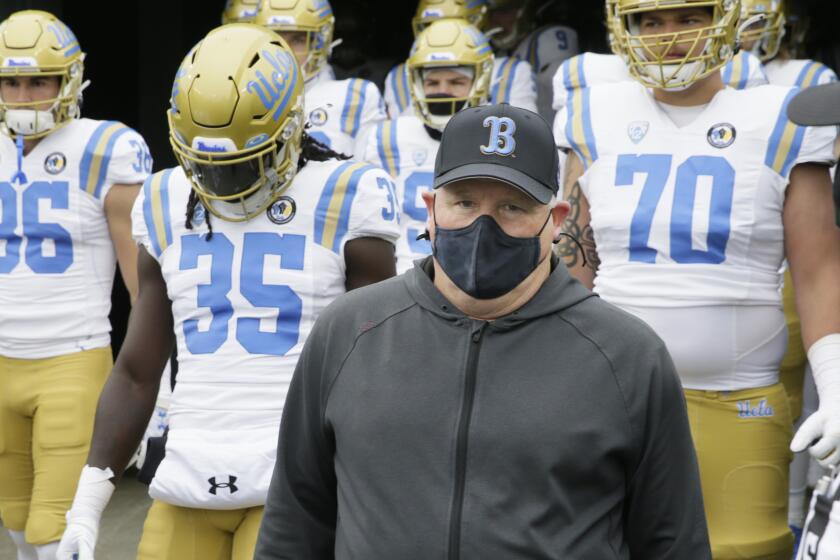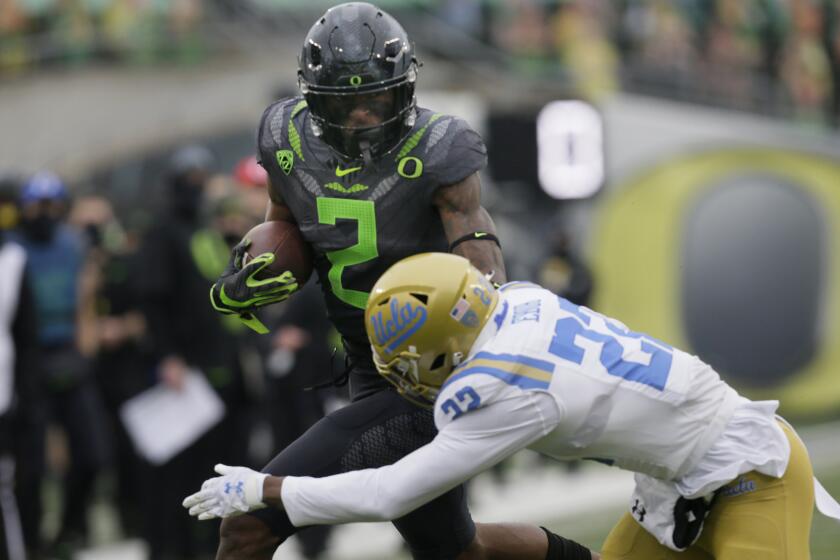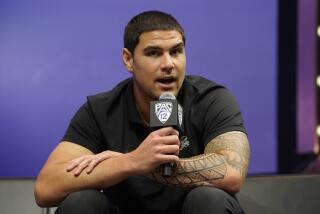Too close for comfort? Why contact tracing sidelined UCLA QB but not his roommate
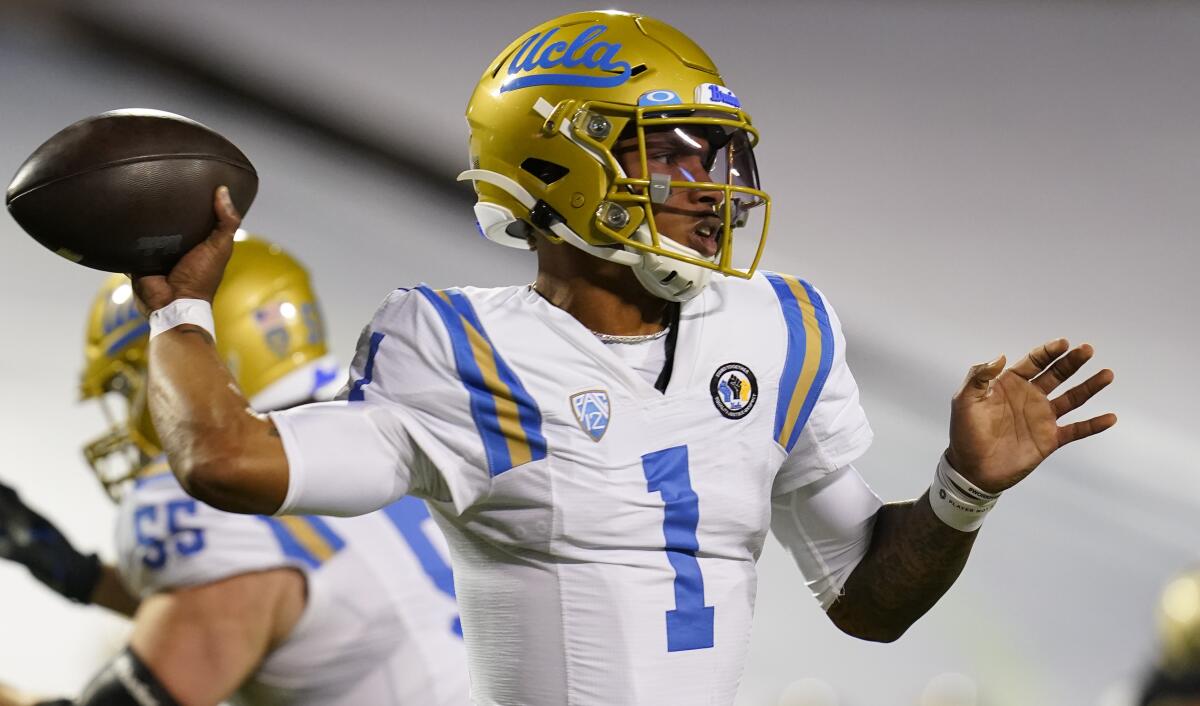
- Share via
College roommates are usually the essence of close contact.
Dorian Thompson-Robinson and Greg Dulcich share a living room and kitchen inside the two-bedroom, two-bathroom apartment they have occupied since late June.
Dulcich said before the season started that they don’t annoy each other, the UCLA teammates agreeing on the thermostat setting and taking out the trash an equal number of times.
But a significant discrepancy arose Saturday. Thompson-Robinson, the Bruins’ starting quarterback, was held out of his team’s game against Oregon because of contact tracing related to COVID-19 while Dulcich, a starting tight end, received clearance to play.
What might have seemed as arbitrary as the coin flip before the opening kickoff of UCLA’s 38-35 loss came down to the players’ self-reporting, according to a person familiar with the team’s safety protocols. While Thompson-Robinson had come in close contact with someone who tested positive for the coronavirus, Dulcich had not. That they lived together made no difference to their status for the game against the Ducks.
UCLA was short-handed in its loss at Oregon after two positive tests among players, coaches or staff forced other players into quarantine because of contact tracing.
Contact tracing does not involve a second level, meaning that if a wide receiver who tested positive listed a defensive back as a close contact, the defensive back would be quarantined but his close contacts would not be unless they overlapped with those of the wide receiver.
Like other Pac-12 Conference schools, UCLA relies on its own players to disclose their close contacts, defined as 15 minutes or more of contact within six feet of someone who tested positive for the virus. Practices and games don’t count because they’re considered to be low risk for spread of transmission as a result of daily testing.
Players report their close contacts each morning before they are allowed to enter the practice facility. Anyone deemed to have come in close contact with an infected person must quarantine for 14 days from the last point of contact because of the potential lag time between infection and testing positive.
That was how the Bruins came to play the Ducks without nine players after two tested positive and seven others were considered close contacts of people who had tested positive. One person close to the team who spoke on condition of anonymity because he was not authorized to publicly disclose how the situation was handled said the roommates of the players who tested positive were held out of the game because of contact tracing.
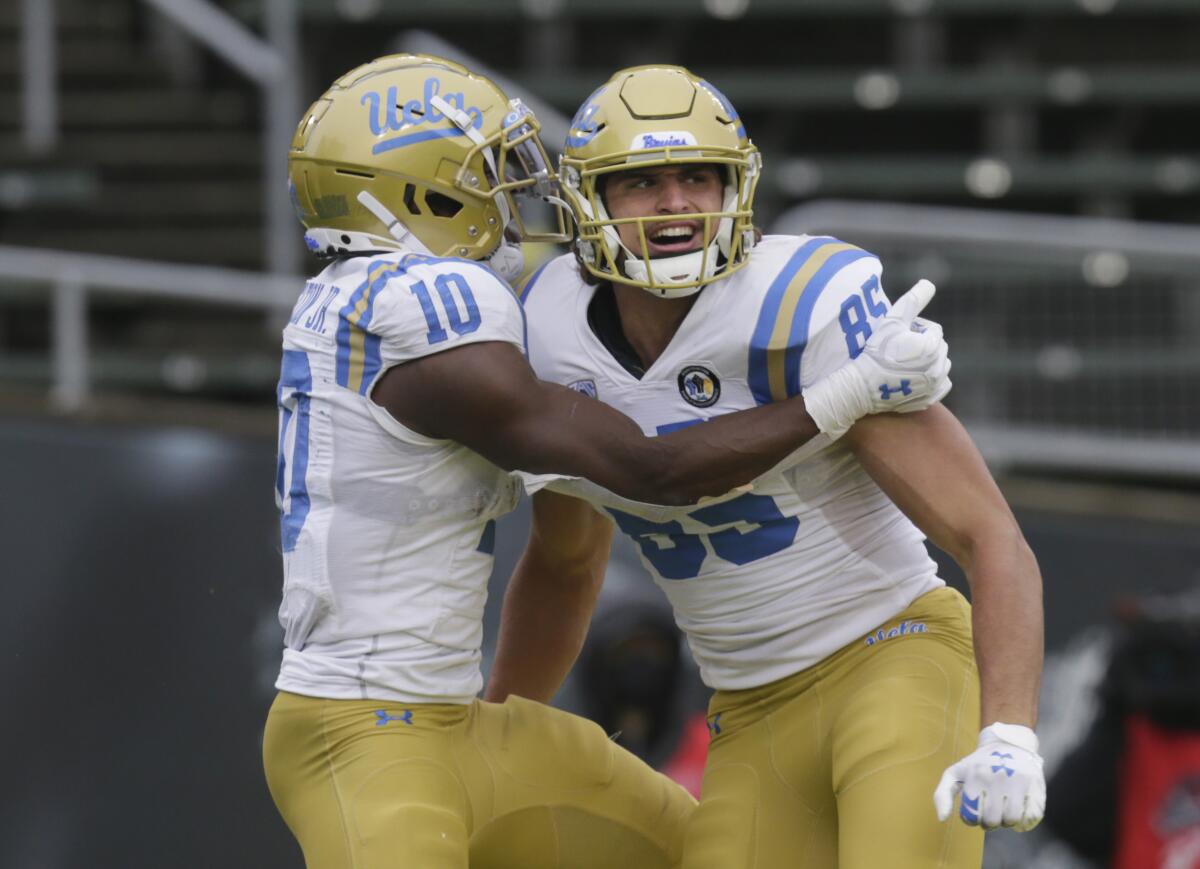
The system relies on player honesty, making it as trustworthy as those doing the reporting. Players can lie about who they were around or fail to disclose someone they spent time with to ensure they’re available to keep playing. Roommates can say they were socially distanced even after watching an hour’s worth of game footage while sitting beside one another on the couch.
“I think everybody on this team is going to put the team first,” UCLA center Sam Marrazzo said Monday. “I mean, coach [Chip] Kelly talks about protecting our ecosystem at all costs all the time, so I don’t think anyone on this team is selfish enough to do something like that” and be dishonest.
Teams do not conduct investigations to verify the information provided by players, according to a person close to a Pac-12 football program. Kelly said he trusted his players to accurately report their close contacts.
“I think our players have taken contact tracing and the whole COVID situation very seriously,” Kelly said, “and I think they’ve been very open and honest with our medical personnel and I think they’ve done a good job with it.”
UCLA is not among the teams that have enhanced their contact tracing efforts through cellphone apps or wearable devices that track player movement. Dr. Christine Baugh, an assistant professor at the University of Colorado’s Center for Bioethics and Humanities, said electronic monitoring offers its own ethical dilemmas regarding privacy.
“It kind of raises a different set of issues,” Baugh said. “I think what would be nice is if we had some uniformity across the conferences and the schools, but that is not the way the entire college football season has played out here, so the contact tracing is not alone in that capacity.”
UCLA’s new attacking defense has ranked as some of the best this season.
It remained unclear how many of the Bruins who were out against Oregon would miss the game against Arizona on Saturday at the Rose Bowl. Those who were out against the Ducks because of contact tracing figure to be out against the Wildcats unless the clock on their quarantine started prior to Nov. 14, two weeks before the game. Players who tested positive must isolate for 10 days or until the verification of a false positive, meaning they could return sooner than those placed into quarantine.
“You guys can play Columbo and investigate,” Kelly told reporters inquiring about who might be able to play, “but I’m not allowed to say anything except is a player unavailable or available.”
UCLA has taken measures to ensure that contact tracing does not wipe out entire position groups like it has at other schools, holding meetings outdoors and distributing food in grab-and-go containers. Those safety protocols helped Demetric Felton Jr. and Brittain Brown play against the Ducks while fellow running backs Kazmeir Allen, Keegan Jones and Martell Irby were all sidelined, much to their annoyance.
“‘Contact tracing’ is some of the dumbest stuff I heard,” Allen tweeted on the day of the game. “If we have 4 negative test [sic] in a row we should be able to play period.”
The Bruins who traveled to Eugene, Ore., boarded buses with capacity limited to 25. On the chartered team plane, middle seats were left open and some rows had only one occupant to help meet passenger capacity requirements.
All team meetings were conducted before leaving campus because of health restrictions that would have barred such gatherings in Oregon. The Bruins even skipped their usual short rah-rah speech before boarding team buses for Autzen Stadium.
Quarterback Chase Griffin played admirably in Thompson-Robinson’s absence and Dulcich made four catches for 55 yards and a touchdown.
In one final concession to the virus, Oregon officials barred the Bruins from shaking hands with the Ducks after the game.
“The disease itself is something that you can’t let your guard down [about] and we preach that every day and we live that every day and we’re living it right now,” Kelly said. “But I think our school has been outstanding.”
More to Read
Go beyond the scoreboard
Get the latest on L.A.'s teams in the daily Sports Report newsletter.
You may occasionally receive promotional content from the Los Angeles Times.

